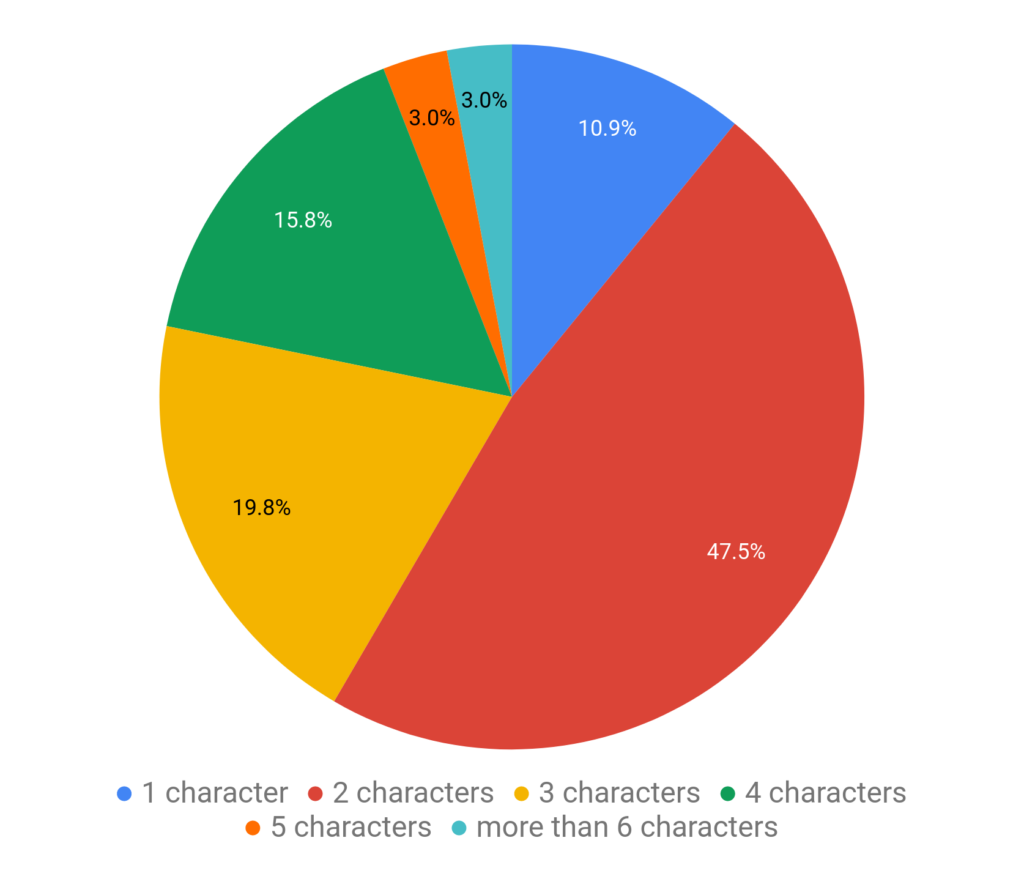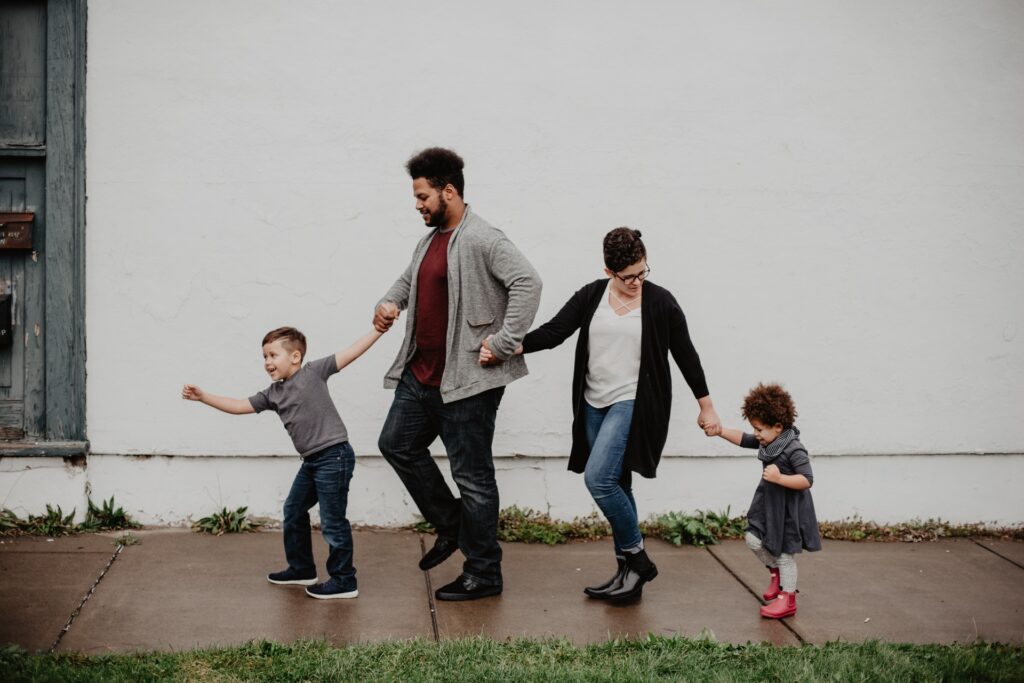In this lesson we’ll learn the Chinese words for Family and Friends.
Table of Contents
Previous Lesson Review
Before we begin, please be sure to review the previous lessons:
How to Say Mum and Dad in Chinese
The characters for Mum and Dad in Chinese are
The words for Mum and Dad just repeat this same character twice, that is
- Mum / Mother
妈 妈 - Dad / Father
爸 爸
While there are single character words in Chinese, two character words are most common. Because of this there are some very common words that just repeat the same character twice, “Mother”
Why repeat the same character twice to make a word? There are two main reasons for this, one is for clarity, because many characters have the same pronunciation but very different meanings, so repeating it twice ensures the listener won’t misunderstand the meaning. The other reason for this that two character words sound more pleasant in Chinese. To demonstrate this check out the chart below, you’ll see that nearly half of all Chinese words are made up of two characters:

If you would like to know a bit more, check out our post: Are Chinese characters words?
How Chinese characters are constructed
The intention of this beginners course is not to focus on how characters are constructed, but to provide some insights into how characters are comprised consider the word for mother. The Chinese character for “mother”
This is the normal way that characters are constructed where one part of the character indicates the meaning and the other indicates the sound, so in the case of mother:
- “female”
女 hints the character relates to a woman - “horse”
马 hints at the sound being “ma”
The “sound” component that makes up a character doesn’t specify the exact sound, as in the case of “Mother” the sound
You may be asking how someone would know the meaning or pronunciation of component characters, for example, how would you know that
If you’d like to know more, check out our post on t What is Chinese Hanyu Pinyin?
Chinese words for friends, family and colleagues
Let’s learn the Chinese words for friends, family and colleagues, as these are the people you are most likely to use or hear in day to day life. As this is a beginners course, we won’t give you a complete list of words for friends and family, however the most common are provided in the table below. You don’t have to memorise these, just pick one or two you’d like to learn which you are likely to use.
| English | Chinese (Pinyin pronunciation) |
|---|---|
| Colleague |
|
| Friend |
|
| Girlfriend |
|
| Boyfriend |
|
| Wife |
|
| Husband |
|
| Younger Brother |
|
| Older Brother |
|
| Younger Sister |
|
| Older Sister |
|
| Father |
|
| Mother |
|
| Son |
|
| Daughter |
|
A few points to note here:
- There are different words for older and younger brother and sister in Chinese, this is important to remember and not get wrong as you wouldn’t want to introduce your younger sibling and being an older sibling or vice versa.
- The words for parents and siblings use a double character, that is the same character twice. There is another way to say these names, which we’ll cover next
- The Chinese words for “boyfriend”
男 朋 友 and “girlfriend”女 朋 友 add a character in front of the word for friend:- The Chinese word for boyfriend
男 朋 友 is made up of the character that means “male”男 +”friend”朋 友 - The Chinese word for girlfriend
女 朋 友 is made up of the character that means “female”女 and the word for “friend”朋 友
- The Chinese word for boyfriend
- “son”
儿 子 and ”daughter”女 儿 are both made up of twosimple characters that don’t have component characters:- “son”
儿 子 is made up of two characters for “son“子 + the character for child子
- ”daughter”
女 儿 is made up of two characters for “female”女 + the character for child子
- “son”
- “colleague”
同 事 is made up of the characters for “same”同 and the character for “work“事 , if you think of it your colleague does the same job as youself, so this is logical and meaningful as Chinese often is.
How to use the “ah” 阿 character in Chinese
If you’ve spent any time listening to Chinese speakers talk about their family, you may hear them use the “ah”
| English | Chinese (Pinyin pronunciation) |
|---|---|
| Younger Brother |
|
| Older Brother |
|
| Younger Sister |
|
| Older Sister |
|
| Father |
|
| Mother |
|
You will also hear people append
How to say English names in Chinese
In Lesson 2 we briefly discussed that English names are phonetically translated, that is a combination of Chinese characters are selected that sound like the English name. Here are some examples:
| English | Chinese (Pinyin Pronunciation) |
|---|---|
| Mary |
|
| Helen |
|
| Mike |
|
| David |
|
As you can see, these names are just made up of characters that sound like the name, but the combination of the characters have no meaning in Chinese. This is unlike Chinese names, which use meaningful characters, for example a parent will choose characters that might mean “success” or “intelligent” in the hopes of bestowing future success on their child.
As a learner I wouldn’t bother trying to memorise Chinese versions of English names, with exception of perhaps your own name. If you’re interested in looking up an English name in Chinese, check out our posts on how to say and write Male Names and Female Names in Chinese.
Let’s use a Chinese name in a sentence:
nǐ jiào shénme
What are you called? (What is your name?)
我叫玛丽
wǒ jiào mǎlì
My name is Mary
Conclusion and Lesson Review
We’ve learned a lot of useful words in this lesson. The most important points to remember are:
- “Mother”
妈 妈 - “Father”
爸 爸 - “Friend”
朋 友 -
阿 is a common prefix used in Chinese - Chinese translations of English names are typically phonetic, that is based purely on the sound of the English name
- Chinese words are made up of component characters that hint at the meaning and pronunciation of the word
- Words are typically made up of two or more characters, with two character words being the most common.
In the next lesson you’ll learn out to introduce people in Chinese.

